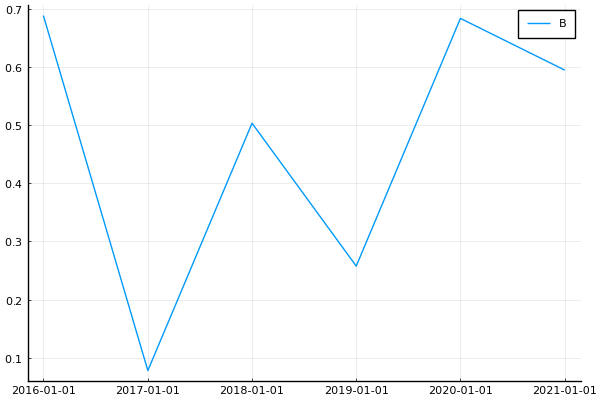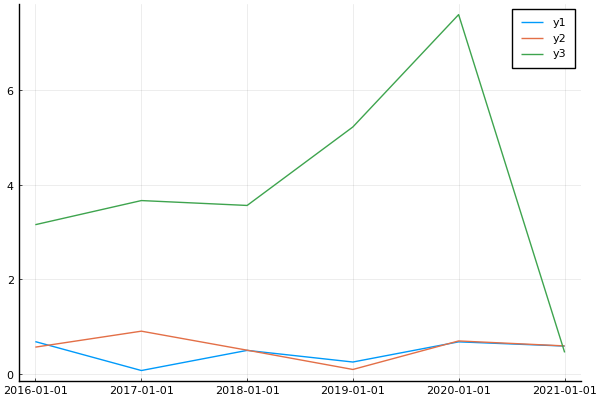This post also answers the question of “How to plot timeseries in Julia Plots”.
using DataFrames, Dates, Plots, StatsPlotstime = collect(Date(2016,1,1):Year(1):Date(2021,1,1))6-element Vector{Date}:
2016-01-01
2017-01-01
2018-01-01
2019-01-01
2020-01-01
2021-01-01df = DataFrame(A=time, B=rand(6), C=rand(6), D=10*rand(6))6×4 DataFrame
Row │ A B C D
│ Date Float64 Float64 Float64
─────┼──────────────────────────────────────────
1 │ 2016-01-01 0.0514108 0.621983 1.89575
2 │ 2017-01-01 0.0424919 0.7281 4.25318
3 │ 2018-01-01 0.435236 0.228105 7.55767
4 │ 2019-01-01 0.489223 0.809564 8.02765
5 │ 2020-01-01 0.223332 0.405445 7.78306
6 │ 2021-01-01 0.426019 0.950642 1.43597It’s Okay if you just want to plot one column, say, Column B:
plot(df.A, df.B, label="B")
However, if you want to plot all other columns, you’ll see an error:
plot(df.A, df[:, 2:4])Cannot convert DataFrame to series data for plotting
...
...We see this error because we need to use matrices (rather than a DataFrame) if we want to plot multiple columns .
So what we need is:
df_matrix = Matrix(df[:, 2:4])
plot(df.A, df_matrix)
That’s good. But, what about the legends?
We can do this:
plot(df.A, df_matrix, labels=["B" "C" "D"])
plot!(size = (750, 400))
But what if you have a lot of columns, say, 100? It’s impractical for you to manually enter their labels. What should we do then?
When we check the labels, we can see that ["B" "C" "D"] is a 1×3 Matrix:
julia> ["B" "C" "D"]
1×3 Matrix{String}:
"B" "C" "D"So we need a matrix of all the column names for the label parameter.
First, let’s get the column names:
label_names = names(df[:, 2:4])3-element Vector{String}:
"B"
"C"
"D"Then, let’s transform this vector to a 1×3 Matrix:
label_matrix = reshape(label_names, 1, length(label_names))1×3 Matrix{String}:
"B" "C" "D"Then, we just pass the label_matrix to label:
plot(df.A, df_matrix, labels=label_matrix)Last modified on 2025-07-02 • Suggest an edit of this page